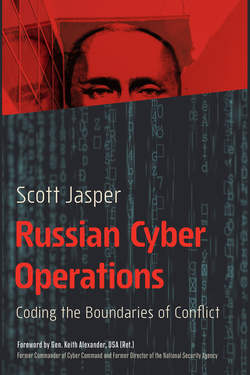Читать книгу Russian Cyber Operations - Scott Jasper - Страница 20
На сайте Литреса книга снята с продажи.
Conclusion
ОглавлениеThe 2017 US National Security Strategy clearly recognizes that “the U.S. is now engaged in a strategic competition with Russia every bit as broad and dangerous as that which existed during the Cold War and which is, in some ways, much more complex.”111 Cyberspace, according to David Luber, the civilian executive director of US Cyber Command, has become “the center of strategic rivalry in this era of renewed great power competition.”112 President Donald Trump has described Russia’s leader, Vladimir Putin, as a competitor rather than an enemy.113 The term competitor fits well in the economic arena, such as for natural gas exports, where the United States has surpassed Russia as the world’s top natural gas producer, although competition in the market could spill into the political arena by reducing the ability of Russia to leverage natural gas as a means to exert political pressure in Europe.114 In addition to economic and political competition, new means of influence and coercion are found in the spread of technology and communications.115 In this manner, US Cyber Command contends that competitors, some considered to be adversaries, constantly operate below the threshold of armed conflict.116 Russia is a competitor that uses cyber operations to influence events and gain advantage and, in some cases, test the thresholds of conflict, without fear of legal or military consequences.
The cyber operations against the energy distribution companies in Ukraine in 2015 demonstrated Russia’s willingness and capability to target critical infrastructure. The intrusion sent a message or a warning to influence and coerce the Ukrainian parliament. Ciaran Martin, the head of the National Cyber Security Centre, part of the Government Communications Headquarters in the United Kingdom, warned the UK parliament that in addition to “traditional” targets such as energy infrastructure, Moscow is deploying cyber technology “against the west as a whole” with a view to undermine “democratic institutions, media institutions and . . . free speech.”117 The next month, Deputy Attorney General Rod Rosenstein warned the Aspen Security Forum of the growing threat from Russian influence operations. He said Russian actions “are persistent, they’re pervasive, they are meant to undermine democracy on a daily basis.”118 However, these persistent actions appear designed to avoid designation as an armed attack. In the United States, cyber incidents are assessed on a “case-by-case basis.”119 US officials are hesitant to articulate red lines within cyberspace, since they provide “adversaries a defined line they can walk right up to without fear of reprisal,” which Russian cyber actors would certainly do.120 Instead, this book offers an analytical framework to analyze and evaluate Russian cyber operations, whether they rise to the level of armed conflict or function as a component of strategic competition.
